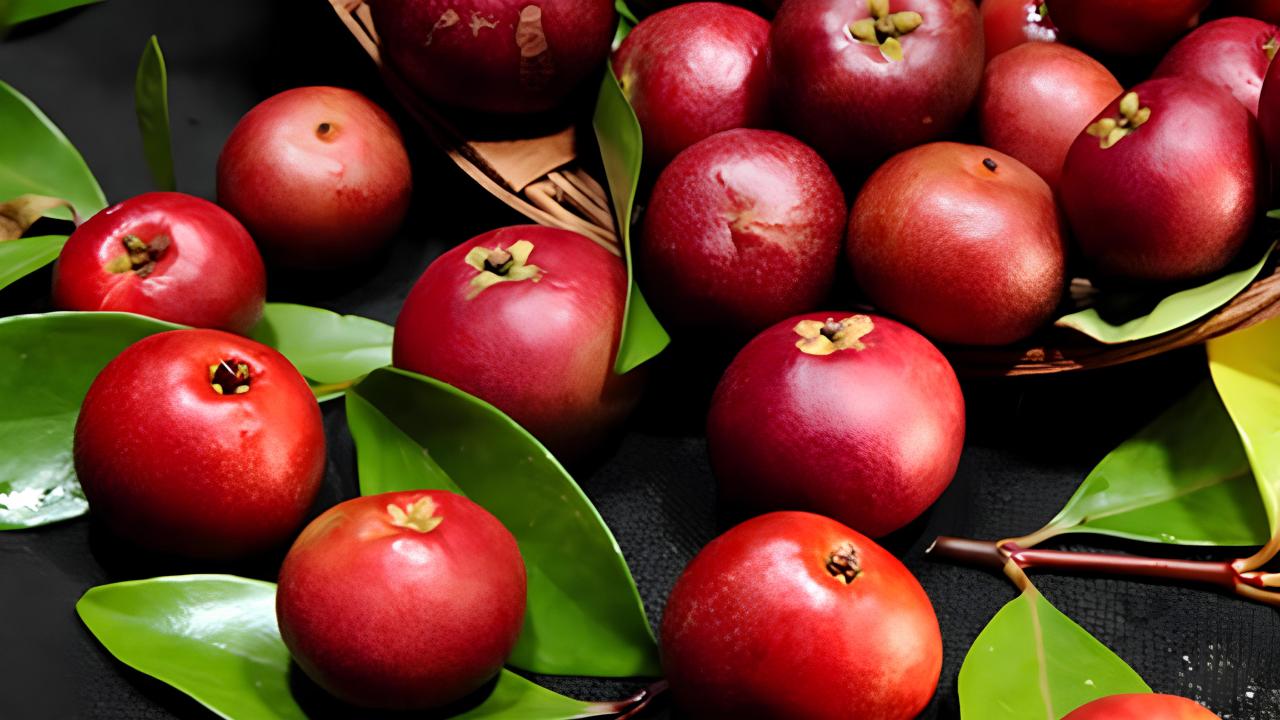Kokum (Garcinia indica): The Wonder Fruit for Health and Wellness
Kokum (Garcinia indica) is a small, tropical fruit known for its deep purple hue and a long list of health benefits. Often hailed as a wonder fruit in Ayurvedic medicine and traditional Indian cuisine, kokum has carved out a niche as both a culinary delight and a medicinal powerhouse. Its vibrant color and unique flavor not only enhance dishes but also add a burst of nutritional value.

Kokum (Garcinia indica) is a small, tropical fruit known for its deep purple hue and a long list of health benefits. Often hailed as a wonder fruit in Ayurvedic medicine and traditional Indian cuisine, kokum has carved out a niche as both a culinary delight and a medicinal powerhouse.
Its vibrant color and unique flavor not only enhance dishes but also add a burst of nutritional value. Rich in antioxidants, vitamins, and minerals, kokum is praised for its ability to aid digestion, support heart health, and promote skin wellness.
Beyond its impressive health benefits, kokum’s versatility allows it to be incorporated into a wide range of recipes, from refreshing drinks to savory dishes, making it a beloved ingredient in kitchens around the world.
What is Kokum?
Kokum is the fruit of the Garcinia indica tree, a species native to India. It has a sweet and tangy flavor, often compared to tamarind but with its own unique profile.
The fruit is typically dried and incorporated into various culinary preparations, including curries, beverages, and chutneys. Beyond its culinary applications, kokum is a key ingredient in herbal remedies, celebrated for its numerous health benefits.
Additionally, it is used in cosmetics for its nourishing properties, enhancing skin health. This versatility establishes kokum as an essential component in both traditional practices and modern innovations.
Vernacular Names: Kokum in Different Languages:
- Hindi: Kokum, Kokam, Komal, Amlaveta, Vishambila
- English: Kokum butter tree, Wild mangosteen, Red mango, Mate mongosteen
- Bengali: Mahada
- Bombay: Kokam, Amsul, Katambi, Bhirand
- Kannada: Dhupadamara, Murgala, Tittidika, Huli, Punarpuli
- Deccan: Kokam, Ratambi
- Goa: Brindao, Amsel, Ratainbasal, Brindoesiro
- Gujarati: Kokam, Ratamba, Kokambel, Birandel
- Kashmiri: Titidika
- Konkani: Birondd, Ratambi, Birondi
- Malayalam: Punampuli
- Marathi: Amosole, Bhirand, Chirand, Katambi, Ratamba
- Portuguese: Brindall
- Tamil: Murgal, Puli
- Telugu: Chinta
- Tulu: Punarpuli
Chemical Composition of Kokum
- Leaves: The leaves of Garcinia indica contain the amino acid LLeucine.
- Heartwood: The heartwood of this plant contains compounds such as Cuxanthone, Volkensiflovone, and Morelloflavone, as well as Comboginol.
- Fruit: The fruit of Garcinia indica contains compounds like Garcinol, Isogarcinol, and Comboginol.
- Seed: The seeds of this plant contain Neutral lipids and glycolipids.
These chemical components play a crucial role in the plant’s diverse properties and potential applications. Polyphenols found in Garcinia indica exhibit antibacterial activity, offering benefits in various uses.
This information is referenced in “Illustrated Dravyaguna Vijnana, Vol. II” by Dr. JLN Shastry.
Ayurvedic Properties of Kokum Butter
Taste (Rasa):
- Sour (Amla) and Sweet (Madhura): The butter is primarily sour, which influences its effects on the body.
Qualities (Guna):
- Dryness (Rooksha): It has a drying effect, which can be beneficial for certain imbalances.
- Heaviness (Guru): Its heavy nature may make it challenging to digest for some individuals.
Taste Conversion After Digestion:
- Retains its sour taste post-digestion, which continues to impact its effects.
Potency (Veerya):
- Hot (Ushna): The sourness contributes to its warming effects. However, when combined with cooling ingredients (like sugar candy or jaggery), it can offer a cooling effect.
Pharmacological Actions
- CNS Depressant: This may help in calming the nervous system.
- Anti-Hyperlipidemic: Supports healthy lipid levels in the body.
- Semen Coagulant: Plays a role in reproductive health.
Dosha Balancing
- Unripe Fruit: Primarily beneficial for balancing Vata and Kapha doshas, helping with imbalances that lead to issues like colic and constipation.
- Ripe Fruit: Mainly aids in balancing Kapha and Vata, often used in treatments for conditions related to these doshas.
Therapeutic Uses
- Digestive Health: Stimulates digestive fire, useful for colicky pain, flatulence, and constipation.
- Disease Management: Can assist in alleviating chronic conditions and disorders associated with Vata and Kapha imbalances.
Medicinal Uses of Kokum in English:
1. Ruchikrut and Rochana:
- Taste Enhancer: Kokum not only improves the flavor of dishes but also stimulates the secretion of digestive juices, making it particularly beneficial for individuals recovering from illnesses or those with a decreased appetite.
2. Deepana:
- Digestive Strength: By enhancing Agni (digestive fire), Kokum aids in the breakdown of food, ensuring that nutrients are properly absorbed. This is especially important for those with weak digestion or who tend to experience indigestion.
3. Sangrahi and Grahi:
- Absorbent Properties: Its absorbent nature helps in forming solid stools, making it effective in managing diarrhea and Irritable Bowel Syndrome (IBS), where the digestive system often fluctuates between constipation and diarrhea.
Indications
- Kapha Arsha: Kokum’s cooling and soothing properties help alleviate symptoms associated with hemorrhoids of Kapha origin, such as swelling and discomfort.
- Trushna: Ideal for quenching excessive thirst, Kokum can be particularly refreshing during hot weather or in cases of dehydration.
- Vataja Udara: By reducing bloating and flatulence, Kokum promotes overall digestive comfort and helps balance Vata dosha, which is often responsible for these issues.
- Hrudgada: As a cardiac tonic, it supports heart health by improving circulation and regulating blood pressure, making it beneficial for individuals with cardiovascular concerns.
- Gulma: Kokum is believed to help manage abdominal tumors, acting as a supportive treatment in cases of benign growths or digestive blockages.
- Atisara: Its effectiveness in treating diarrhea and dysentery stems from its ability to normalize bowel movements and provide relief from associated discomfort.
- Vrana Dosha: When applied topically, Kokum can facilitate the healing of ulcers and infected wounds, promoting tissue regeneration and reducing inflammation.
- Grahani: Kokum’s balancing effect on digestion makes it particularly useful for managing IBS, sprue, and conditions that alternate between diarrhea and constipation, providing stability to digestive processes.
- Shoola: By relaxing the digestive tract, Kokum helps alleviate abdominal colic pain, making it a natural remedy for discomfort and spasms.
- Jantu: Its properties also extend to parasitic infections, as Kokum can help expel worms and other intestinal parasites, contributing to overall gut health.
Additional Uses
- Fermented Products: In addition to its medicinal properties, Kokum is often used in traditional beverages, such as Raaga, where its tangy flavor adds a unique taste and potential health benefits, such as improving digestion and enhancing immunity.
The Top 10 Benefits of Kokum (Garcinia Indica)
Kokum (Garcinia indica) offers numerous benefits; here are some of the key ones that highlight its remarkable potential for enhancing health and well-being. From digestive support to skin health, Kokum is a versatile fruit that has been valued in traditional medicine for centuries. Let’s explore some of its most noteworthy advantages.
1. Digestive Aid
Kokum enhances digestive fire (Agni), making it effective in alleviating issues like indigestion, bloating, and constipation. Its sour taste stimulates the secretion of digestive enzymes, promoting better digestion and nutrient absorption. Regular consumption can help maintain a healthy gut flora and prevent gastrointestinal disorders.
2. Weight Management
Known for its appetite-suppressing properties, Kokum may aid in weight management by promoting feelings of fullness and reducing cravings. The fruit’s active compounds, such as hydroxycitric acid (HCA), have been studied for their role in inhibiting fat storage and increasing metabolic rate, making it a popular choice in weight-loss diets.
3. Anti-Inflammatory Properties
The fruit contains bioactive compounds that possess potent anti-inflammatory effects. This makes Kokum beneficial for reducing inflammation in conditions such as arthritis and other inflammatory diseases. By modulating inflammatory pathways, it can help alleviate pain and swelling, improving overall mobility.
4. Heart Health
Kokum is beneficial for cardiovascular health as it may help lower cholesterol levels and improve blood circulation. The antioxidants found in Kokum protect the heart from oxidative stress, while its ability to support healthy blood pressure levels can contribute to overall heart function, reducing the risk of heart-related diseases.
5. Skin Health
Rich in antioxidants, Kokum promotes healthy skin by combating oxidative stress and reducing signs of aging, such as wrinkles and fine lines. Its moisturizing properties help soothe dry skin and may assist in treating conditions like eczema and acne. Kokum butter, derived from the fruit, is often used in skincare products for its nourishing effects.
6. Cooling Effect
Kokum has a natural cooling effect on the body, making it especially beneficial in hot climates or during summer months. It helps alleviate excessive thirst and heat-related issues, such as heat exhaustion or heat stroke. Consuming Kokum juice or syrup can provide instant relief and hydration.
7. Antioxidant Properties
Rich in antioxidants, Kokum helps combat oxidative stress and protect the body from free radical damage. This not only supports overall health but also plays a role in preventing chronic diseases, including cancer and heart disease. The antioxidants in Kokum help strengthen the immune system, promoting better health resilience.
8. Mood Enhancer
Some studies suggest that Kokum may have mood-enhancing effects. Its compounds can help reduce stress and anxiety levels, promoting a sense of calm and well-being. By influencing neurotransmitter levels in the brain, Kokum may contribute to improved mood and emotional balance.
9. Antimicrobial Activity
Kokum exhibits antimicrobial properties that can help fight infections and support the immune system. Its natural compounds can inhibit the growth of harmful bacteria and fungi, making it a useful addition to natural remedies for infections. Regular consumption may enhance the body’s defense mechanisms against pathogens.
10. Blood Sugar Regulation
Preliminary research indicates that Kokum may help in managing blood sugar levels. Its compounds may improve insulin sensitivity and glucose metabolism, making it a potential aid for individuals with diabetes or metabolic disorders. Incorporating Kokum into the diet may help stabilize blood sugar levels and reduce the risk of complications.
Ayurvedic Medicines That Contain Kokum as Ingredients:
1. Hingvadi Churna
Hingvadi Churna is a potent Ayurvedic digestive powder formulated to tackle various gastrointestinal issues. This traditional remedy combines a blend of spices and herbs known for their therapeutic properties.
The formulation often incorporates Hing (asafoetida), which is renowned for its ability to relieve gas and bloating, along with black pepper, rock salt, and Garcinia indica. Each ingredient plays a vital role in enhancing digestion and promoting gut health.
Key Benefits:
- Digestive Stimulant: The combination of these ingredients not only aids in digestion but also enhances the overall digestive fire (Agni), making it particularly useful for individuals with weak digestion or a tendency toward digestive disturbances.
- Anti-inflammatory Properties: Hingvadi Churna has anti-inflammatory properties that can soothe the digestive tract, reducing inflammation and discomfort associated with conditions like gastritis or indigestion.
- Nutrient Absorption: By promoting better digestion, this formulation may improve nutrient absorption, ensuring the body receives essential vitamins and minerals from food.
2. Yavanyadi Choornam
Yavanyadi Choornam is a balanced Ayurvedic powder specifically formulated for respiratory health. Combining a unique blend of herbs such as Yavan (cumin), black pepper, and Garcinia indica.
It serves as a potent remedy for respiratory ailments. Deeply rooted in traditional practices, this formulation supports lung function and promotes overall respiratory wellness.
Key Benefits:
- Expectorant and Mucolytic: Yavanyadi Choornam acts as an expectorant, helping to clear mucus from the respiratory tract, making it easier to breathe. This is especially beneficial during colds or respiratory infections where mucus buildup can be a significant issue.
- Antimicrobial Effects: The ingredients in this formulation often possess antimicrobial properties that may help combat infections, providing added support during respiratory illnesses.
- Supports Lung Function: Regular use of Yavanyadi Choornam can help strengthen lung capacity and resilience, making it an excellent choice for individuals prone to respiratory issues, such as asthma or bronchitis.
How to Use Kokum in Various Forms:
1. Kokum Juice: The fruits of Kokum are dried and then soaked in water to prepare its juice. It is typically administered in a dose of 100 ml, 2 – 3 times a day. Kokum juice is often consumed for its cooling and digestive properties.
2. Kokum Fruit Powder: Kokum fruit can be dried and ground into a powder. This powder can be consumed as a dietary supplement or added to various dishes for flavor and health benefits.
3. Kokum Root Bark Decoction: The root bark of Kokum can be used to prepare a decoction. This decoction is then administered for its potential therapeutic effects.
4. Kokum Capsules: Kokum is also available in capsule form. The regular dose is typically 1 capsule taken 2 times a day after food. This convenient form is useful for those who prefer standardized dosages.
5. Kokum Leaf Chutney: The tender leaves of Kokum can be used to prepare chutney, which is a paste used along with dishes. It is often administered for the treatment of gastritis and headache arising due to gastritis (bilious headache). The typical dose is 3 – 5 grams, once or twice a day, before meals.
6. Kokum Leaf with Buttermilk: Kokum’s tender leaves can be crushed and administered along with buttermilk to alleviate headache and gastritis.
Parts Used
1. Fruit: The fruit of Garcinia indica is the most commonly utilized part, known for its sour taste and health benefits, including digestive support and appetite enhancement.
2. Root Bark: The root bark is valued for its medicinal properties, particularly in addressing gastrointestinal issues and providing anti-inflammatory benefits.
3. Seed Oil: Extracted from the seeds, the oil is often used for its therapeutic effects, including skin health and digestive support.
4. Tender Leaves: The young leaves are sometimes used in traditional remedies for their health benefits, contributing to digestive and overall well-being.
Dosage
1. Root Bark Decoction: 40-80 ml
This decoction is typically prepared by boiling the root bark in water, making it effective for digestive issues and other ailments.
2. Fruit Syrup: 10-20 ml
A syrup made from the fruit can be used to improve taste, stimulate appetite, and support digestive health.
3. Seed Oil: 3-5 drops
The oil can be taken directly or mixed with other substances for therapeutic applications, particularly for digestive or skin health.
4. Vrikshamla Swarasa (Juice Extract): 5-10 ml
This fresh juice extract from the fruit is concentrated and can be consumed for its digestive benefits and to balance doshas.
FAQs
Kokum (Garcinia indica) is a remarkable fruit that offers a wide array of health benefits, from enhancing digestion to promoting skin health and supporting heart function. Its rich nutritional profile, combined with its versatility in culinary and medicinal applications
- Pharmacological Activity of Garcinia indica (Kokum): An Updated Review(1)
- Kokum (Garcinia indica) Fruit: A Review(2)
- The chemistry and medicinal uses of the underutilized Indian fruit tree Garcinia indica Choisy (kokum): A review(3)
- Evaluation of bioactive constituents of Garcinia indica (kokum) as a potential source of hydroxycitric acid, anthocyanin, and phenolic compounds(4)


























